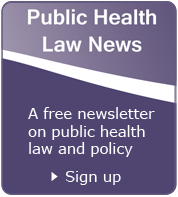About Us

Law is a tool for protecting and promoting the health of the public. Law has been critical in attaining public health goals, serving as a foundation for governmental public health activities. Many of public health’s greatest successes, including high childhood immunization rates, improved motor vehicle safety, safer workplaces, and reduced tooth decay, have relied heavily on law. Further, law is playing an increasingly important role in addressing emerging public health threats such as childhood obesity, healthcare-associated infections, motor vehicle injuries, and prescription drug overdoses.
Former CDC Director Jeffrey Koplan established the Public Health Law Program (PHLP) in 2000 after consultations with CDC programs and extramural partners to lead the agency’s public health law efforts. The Public Health Law Program is currently in the Office for State, Tribal, Local and Territorial Support (OSTLTS).
PHLP works to improve the health of the public by developing law-related tools and providing legal technical assistance to public health practitioners and policy makers in state, tribal, local, and territorial (STLT) jurisdictions.
PHLP works with STLT public health departments and other partners to:
- Identify public health law priorities
- Research laws that impact the public’s health
- Analyze public health legal preparedness
- Conduct comparative analyses across jurisdictions
- Prepare guidance, articles, reports, and toolkits
- Develop and disseminate public health law curricula
If you would like more information about PHLP or have questions about what we do and how we do it, please send us a request for more information.
Are you a student interested learning how law can be used as a tool to protect and promote the public’s health while earning academic credit? Learn about the CDC Externship in Public Health Law.
- Page last reviewed: December 17, 2013
- Page last updated: December 17, 2013
- Content Source:




 ShareCompartir
ShareCompartir



